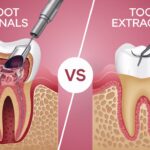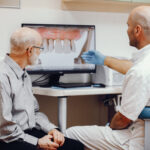What are Dental Caries? Dental Caries Treatment Options
Dental caries, also known as tooth decay or cavities, is one of the most preventable but persistent dental diseases, often necessitating emergency dental services. Dental caries are permanently damaged areas on the hard surface of your tooth (enamel) that lead to tiny holes. When you eat certain food items, the bacteria in your mouth break them down and release harmful acids that lead to cavities on your tooth’s surface. That’s how you get dental caries. Even though dental caries can happen to anyone, they’re most common amongst children because of poor oral hygiene and their affinity to sweets and candies, both of which increase the incidence of bacterial infections.
What causes dental decay?
Generally, dental decay and caries can be found on two parts of the tooth’s structure — occlusal caries and interproximal caries. Occlusal caries occurs on the uppermost parts of the tooth, where food particles affect your tooth’s structure. Interproximal caries are the cavities between the teeth. Bacteria can accumulate on any of these parts of the tooth’s surface, leading to dental caries and cavities. Suppose you’re not through with your oral hygiene habits, such as brushing and flossing. In that case, the bacteria will accumulate and digest the sugars and foods leftover on your teeth, breaking them down into acids that demineralize the tooth’s enamel, forming small holes. As the enamel continues disintegrating, your tooth loses the ability to reinforce the tooth’s calcium and phosphate through saliva. Furthermore, the bacterial decay’s acidic remains enter the tooth’s structure, rotting it from the inside.What are some treatments for tooth decay?
According to a professional emergency dentist in Houston, TX, there are four official methods of treating the damage caused by dental caries — dental fillings, crowns, root canals, and extractions. However, these methods aren’t interchangeable, and the dentist will recommend different procedures depending on the condition of your dental decay. The following is a brief overview of the treatments for tooth decay, according to their severity.Dental Fillings
Dental fillings are the most popular and least invasive means of treating dental decays, but they’re only suitable if the dental decay hasn’t spread into the tooth’s surface. You can opt for dental fillings if your dentist detects dental decay at an early stage, so you must go for regular dental checkups. During the dental fillings procedure, the emergency dentist drills into the tooth’s structure to remove the decayed materials from inside the cavity. Once the cavity has been cleaned and disinfected, the dentist adds the filling. Dental fillings can be made of several materials, but composite resin is the most popular tooth-colored filling material. The greatest advantage of using composite resin is that the dentist can choose a color that accurately matches your surrounding teeth, allowing them to fill the cavity with a natural-looking product. The end result looks completely natural, and no one can tell that you have a filling.Dental Crowns
Dental crowns are a slightly more severe option for people suffering from severe dental cavities. This is only suitable if a large portion of your tooth has been damaged by the cavity, and there’s no way to fill the cavity with a filling. During this procedure, the dentist removes all the infected parts of the tooth and files the tooth down to a small stub. Once the tooth is filed down, the dentist attaches a tooth-shaped and tooth-colored crown over the existing tooth’s remaining structure. Dental crowns can be made to look like your natural teeth, and they strengthen your teeth’s natural structure. Porcelain is the most popular material for dental crowns because it resembles enamel in its translucence and texture. Other popular materials for dental crowns are metallic alloys and composite resin.Root Canals
A root canal is a slightly more invasive procedure necessary if the dental decay has spread into the tooth’s root canal or pulp chamber. The root canal is the internal part of the tooth with the nerves, pulp, and blood vessels. If the infection spreads into the root canal, the dentist has no option but to empty the contents of the tooth’s structure. The dentist drills a hole into the tooth and removes all of the infected parts of the pulp chamber, emptying it out and disinfecting it. After the disinfection, the dentist fills it with composite resin or other materials. However, root canals leave your teeth in a weakened position. As such, the dentist may recommend a dental crown to strengthen the tooth’s structure, preventing it from cracking under pressure.Tooth Extractions
If you don’t contact an emergency dentist in Houston promptly, the cavity will continue spreading until the infection reaches your tooth’s root structure. That’s when your tooth becomes unsalvageable, and the dentist may recommend removing the tooth to protect the surrounding teeth. Depending on the condition of the tooth, you may need a simple or surgical dental extraction. After tooth extraction, the dentist may discuss possible restoration procedures, such as dental implants or dental bridges.How to prevent dental caries and decay?
Prevention is the best treatment, and dental caries are completely preventable. You must maintain optimal oral hygiene, which includes brushing twice a day, flossing regularly, and rinsing your mouth with an antibacterial mouthwash. You must also go for two dental cleanings and dental checkups per year, so the dentist can look for signs of dental cavities and treat them at the earliest stage.Schedule an appointment with an emergency dentist in Houston, TX
If you have dental caries, or the signs and symptoms of dental decay, you must contact an emergency dentist in Houston, TX immediately. URBN Dental is a great dentist open on Saturday in Houston, and we provide some of the most effective dental caries treatment options. For more information, please schedule an appointment with our emergency dental clinic today.URBN Dental Services in Houston, TX
Houston | Katy | Montrose | West University Place | Greater Third Ward | Greater East End | North East Houston | Houston Heights | Central Northwest | Fairbanks | Acres Home | East Houston | Southeast Houston | Central Southwest | Fort Bend Houston | Brays Oaks | Meyerland Area | Sharpstown | Alief | Westchase | Memorial | Northwest Houston | Katyland | Whispering Lakes | Pine Lakes | Woodcreek Reserve















